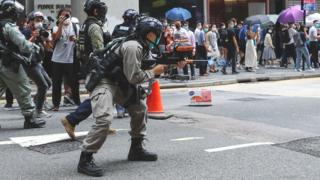 Image copyright
Reuters
Image copyright
Reuters
Police in Hong Kong have fired pepper pellets at protesters as MPs gather to debate a bill that would criminalise insulting China's national anthem.
Small protests are taking place in several locations, and dozens of people have been arrested.
The second reading of the bill comes amid high anti-mainland sentiment.
Days ago, China also proposed implementing a controversial national security law, which triggered a burst of unrest.
Critics say that bill is a direct attempt to curtail the city's unique freedoms.
However, the city's leader Carrie Lam has denied that the national security law - which would ban treason, secession, sedition and subversion - would curtail the rights of Hong Kongers.
If the anthem bill becomes law, anyone who misuses or insults China's national anthem, the March of the Volunteers, would face a fine of up to HK$50,000 (£5,237; $6,449) and up to three years in prison.
If it passes the second reading in the Legislative Council (Legco) on Wednesday, it could go to a third reading and a vote early next month.
Riot police surrounded the Legco building in Central, setting up a street cordon, but hundreds of protesters still gathered around lunchtime, blocking streets and chanting slogans.
Early in the afternoon, there were brief clashes as protesters ran through the streets. Police fired pellets containing irritants towards them.
Protesters also disrupted traffic and public transport in other locations. Local media said about 80 people had been arrested, some for carrying offensive weapons.
Hong Kong does not have its own anthem and so the Chinese anthem is sometimes played at events like football matches.
In recent years, the anthem has been booed frequently. The 2022 Fifa World Cup qualifier, for example, saw thousands booing when the Chinese national anthem was played before the start of the game.
Anti-mainland sentiment remains high in Hong Kong, fuelled especially by a proposed bill last year that would have allowed criminal suspects to be extradited to China. The bill triggered months of increasingly violent protests.
Last weekend saw the city's first large-scale protests in months, with people defying pandemic social-distancing rules to march in protest of the proposed security law. It is set to go to a vote this week, and could be in force as early as the end of June.
Hong Kong's Basic Law, which has been in place in the city since it was handed back to China in 1997 by the UK, guarantees it certain freedoms like the right to protest.
There are fears that the new law could undermine this autonomy, and potentially allow China to install its own law enforcement agencies in Hong Kong, alongside the city's own.
A group of 200 senior politicians from around the world have issued a joint statement criticising China's plan.
On Tuesday, President Donald Trump said the US would announce a "very powerful" response to the proposed legislation before the end of the week. China's plans had already been condemned by Secretary of State Mike Pompeo, who described them as a "death knell" for the city's freedoms.
The UK, Australia and Canada have also expressed their "deep concern".